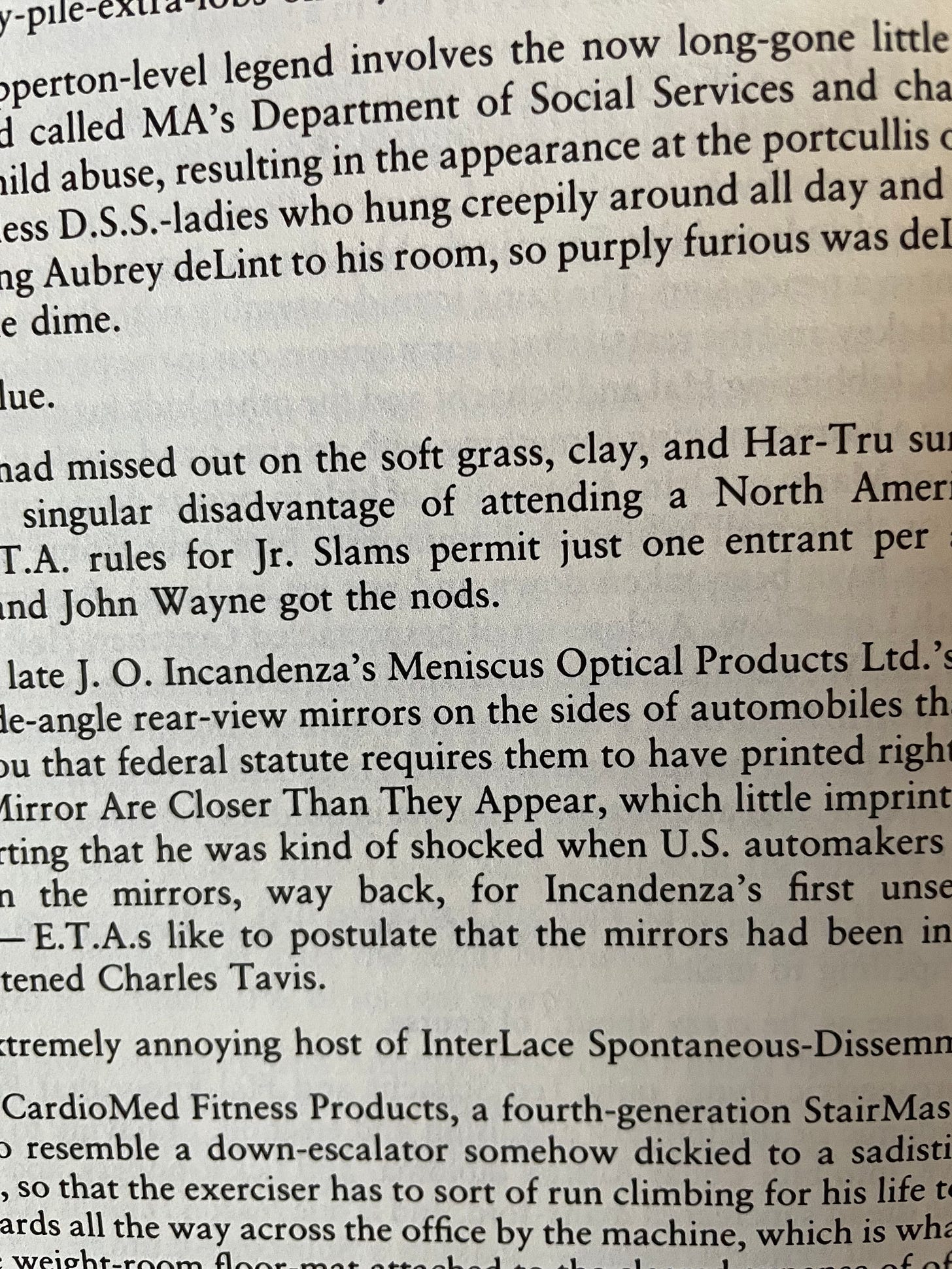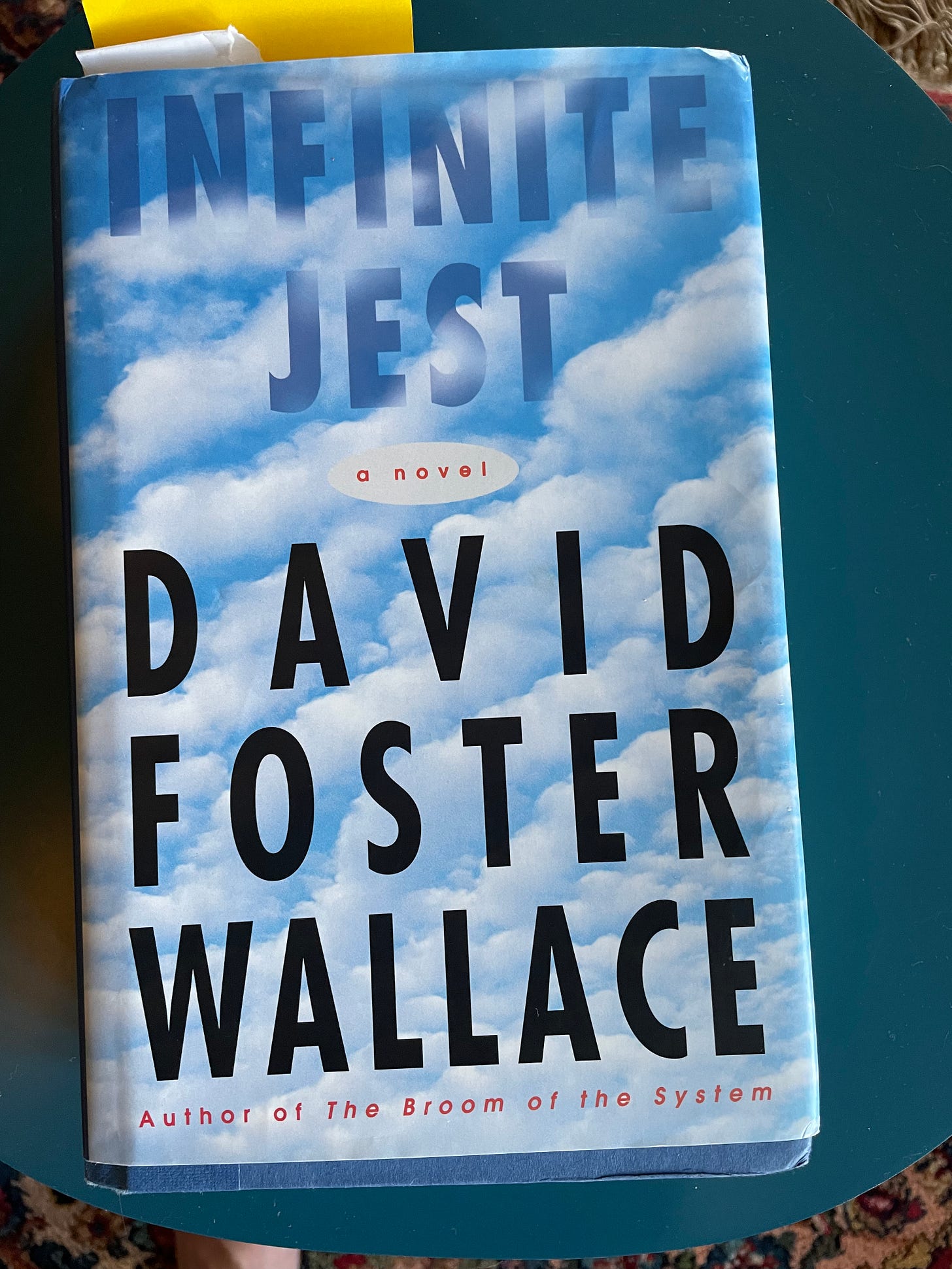So you want to read David Foster Wallace, but don’t want to commit to Infinite Jest?
Yes, it’s long: 981 pages plus 96 pages of “notes and errata” (which are footnotes, some of them with their own footnotes, in 8-point font). And yes, you should read the footnotes. Some of them—like most footnotes—are important, and some aren’t. But you don’t know which is which if you skip them.
And maybe, like me, you’ve made several runs at reading this book. It took me four tries: the first time, I gave up at about page 150. The second time, I made it to 469, but realized that I wasn’t even halfway done, and became demoralized. The third time I made it to page 701—so close, but still over 200 pages to go. And then, on the fourth try, I finished it.
I love to ask students what they think of the ending—it’s a bit of a test, to see if they have really read the book or are just bullshitting (often, they are just bullshitting). Infinite Jest is notorious for being one of those books that no one has read, but that lots of people claim to have read. There’s a funny article in the New Yorker about the aura that surrounds the reading of this book, and Infinite Jest appears on the 2015 list of books that literally all white men own. The book is sometimes dismissed as “lit-bro” reading and Wallace as a hero of lit-bros.
Maybe spending several months reading Infinite Jest isn’t worth it? Life is short. And since people talk about Infinite Jest without having read it, then maybe you don’t really need to read the whole thing. I’ve asked the students who will be in my David Foster Wallace and Metaphilosophy class in the fall to read it over the summer, but that’s because it’ll help them make connections to the other things we’ll read.
I don’t know if it’s worth reading the whole book otherwise, to be honest. Unless you want bragging rights. Or you teach it.
But maybe you’d like to read some Wallace without jumping into Infinite Jest? This is, in my opinion, an excellent idea. I actually think that his short stories and essays are better than his novels (though I think that might not be a popular opinion). And so, if you think, “well, I’d like to read some Wallace, but I don’t think I want to read Infinite Jest just yet,” I’ve got a list for you!
“Consider the Lobster” (nonfiction essay)
The essay is in a collection by the same name, but you can also read it in its original publication, which I recommend: Gourmet Magazine: http://www.gourmet.com.s3-website-us-east-1.amazonaws.com/magazine/2000s/2004/08/consider_the_lobster.html. It’s a report about a trip to the Maine Lobster Festival, but it is also a meditation on the question of sentience and pain behavior. It ends with a question that Wallace says troubles him: is it impolite to ask people to think philosophically about the food they eat?
Oblivion (collection of short stories)
My favorite stories in this collection are “The Soul is Not a Smithy,” “Philosophy and the Mirror of Nature,” and “Good Old Neon”. “The Soul is Not a Smithy” is a title that makes reference to James Joyce, but it’s not clear why Wallace appended it to the story, other than to show the ways in which the things we pay attention to might not be the things that seem “objectively” important. The story combines pseudo-news, documentary record keeping, and a young boy’s thoughts about a dog and a rather gory but melodramatic story. But while the boy is looking out the window of his schoolroom, thinking (cinematically) about this story, the substitute teacher in his classroom seems to be losing his mind and his grip.
“Philosophy and the Mirror of Nature” is also a borrowed title with no clear connection to the story. The story, which is hilarious, is told from the perspective of a man who live with his mother and who loves spiders. His mother has had several unsuccessful plastic surgeries, and she now looks perpetually frightened. She and her son take a bus ride together and people think that her face is a reflection of her fear, which they think is caused by her son. Did I mention that he’s partial to black widow spiders?
“Good Old Neon” is told by a guy named Neal, who, we find out, is telling us about his choice to kill himself. He’s a fraud, he says, and can’t seem to convince anyone of this. It’s a classic self-referential problem—basically a version of Russell’s paradox.: The liar who tells you that he’s a liar; The barber who shaves all and only those who do not shave themselves (so if he doesn’t shave himself, then he does shave himself….). This story won an O. Henry award, and while it is a version of a logical paradox, it is also a metafiction, since we learn about Neal’s thoughts about a guy he went to high school with, named Dave—who might be the real author.
“Incarnations of Dead Children” and “Another Pioneer” are, I think, sort of like horror stories, and when I had students read “Incarnations” in a class one student couldn’t believe that Wallace would write something so disturbing. Oblivion itself might be read as a collection of horror stories—though the stories sometimes have absurd and funny aspects, too.
A Supposedly Fun Thing I’ll Never Do Again (nonfiction)
This book has several essays (eg “E Unibus Pluram”, “Greatly Exaggerated”) and a couple of autobiographical/philosophical reflections: “Derivative Sport in Tornado Alley,” “A Supposedly Fun Thing I’ll Never Do Again,” (about a cruise experience); “Getting Away from Already Being Pretty Much Away From It All” (about his visit to the Illinois State Fair); “Tennis Player Michael Joyce’s Professional Artistry….”(a reflection on the beauty of tennis, the place of choice in life, and the role of discipline and humanness in sports.
Some of my writer friends hate this book, saying that Wallace’s snobbery is mean and it’s definitely on full display in this collection. And his father disputes some of the facts that Wallace relies on in his account of his tennis career in the Midwest (read D. T. Max’s biography of Wallace for some reflections on Wallace’s growing up and relationships) . Wallace also seems to be prone to projectile vomiting, which he does in several of these stories. So be forewarned: you might not like him much: he is pretty judge-y in this book, as he is in “Consider the Lobster.” And at least, with Infinite Jest, you can ignore those aspects of Wallace. But you can also give up on reading these books in their entirety without feeling bad about it.



